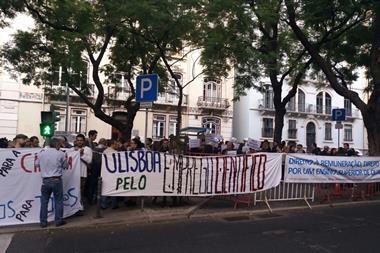Poor ratings in research assessments leave departments facing a funding crisis
Scientific research centres across Portugal are facing dramatic funding cuts following a large-scale review carried out by the country’s Foundation for Science and Technology (FCT). The chemical sciences have fared particularly badly, with more than a third of chemistry departments evaluated set to receive no or minimal funding over the next five years, putting them at significant risk of closure.
The decision is part of the 2013 evaluation of R&D units carried out by the FCT, the main government organisation responsible for funding research in Portugal. During the first stage of the evaluation, research centres are reviewed and graded by panels of experts appointed by the European Science Foundation, based on several criteria including scientific merit, productivity and strategic plans.
Only those deemed ‘very good’, ‘excellent’ or ‘exceptional’ will move on to the next stage of the review that will decide how much funding each department will get. Those given a ‘poor’ or ‘fair’ rating will get nothing for the duration of the 2015–2020 funding period, starting in January 2015. Those rated ‘good’ will receive only core funding, ranging from €5000 (£3960) for the smallest labs up to €40,000.
Across all research areas, 22% of all centres evaluated were given a poor or fair rating and will get no funding at all. Of the 16 chemistry research centres evaluated, six failed to receive a high enough rating to proceed to the next round. Some of these centres received a very good or excellent rating in previous reviews, and are suddenly facing a severe loss of income.
‘FCT funding is vital for chemistry research in Portugal,’ explains Anthony Burke, a chemistry professor at the University of Évora’s chemistry department, which is one of the groups affected. ‘Besides EU funding, FCT funding is the principal source of funding for chemical research, including PhD and postdoc scholarships. There is virtually no industrial funding.’
The Portuguese Chemical Society (SPQ) said it is ‘deeply concerned’ by the review’s outcome, and urged the FCT to look again at its evaluation processes.
‘Several chemistry research centres have not passed the second stage of the evaluation process, which essentially condemns them to extinction,’ they said in a statement. ‘Some of these research centres have significant indicators of scientific productivity, based on the fact that they mostly received “excellent” or “very good” ratings in previous reviews.’
SPQ secretary general Sérgio Seixas de Melo tells Chemistry World that the society carried out its own bibliographic study based on data provided by Elsevier. ‘We found that in many research fields some of the most productive [centres] were excluded from the second stage,’ he says. ‘Something went definitely wrong in this evaluation procedure.’
But the FCT strongly denied that their assessment methods were in any way flawed. They issued a statement saying they had ‘full confidence in the robustness of the ongoing review’ and that it was being carried out with ‘total transparency, rigour, independence and in line with the highest international standards’.
Research centres can appeal the FCT’s decision, and some have already begun this process.












No comments yet